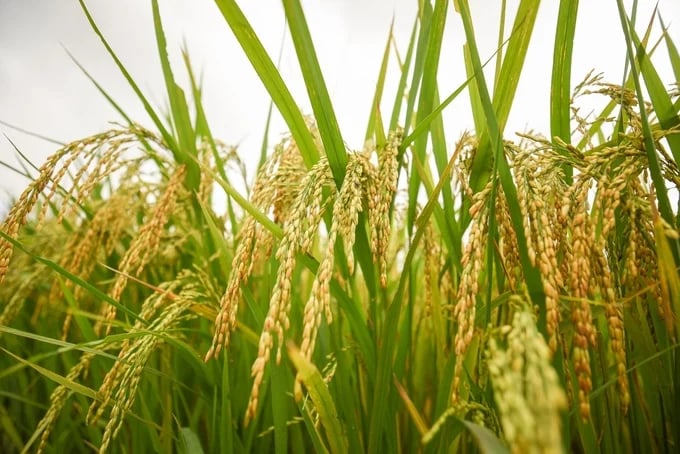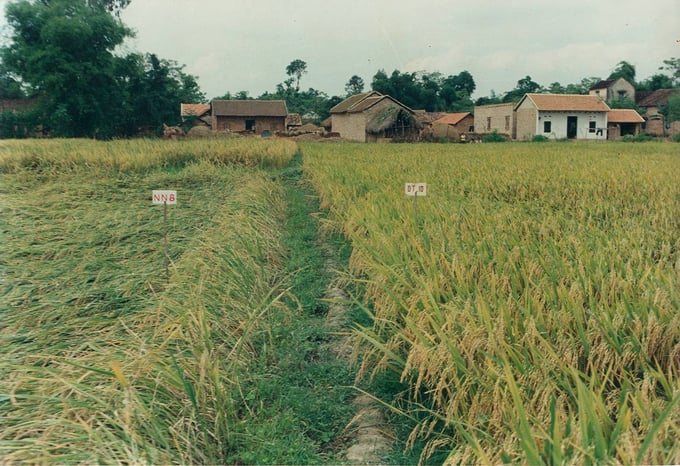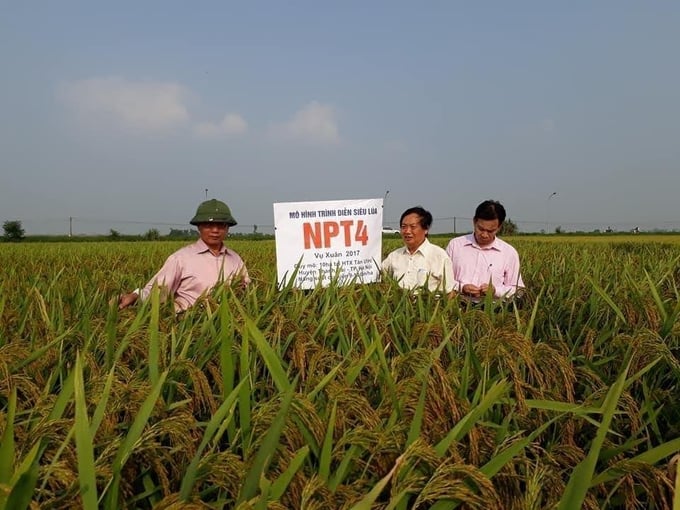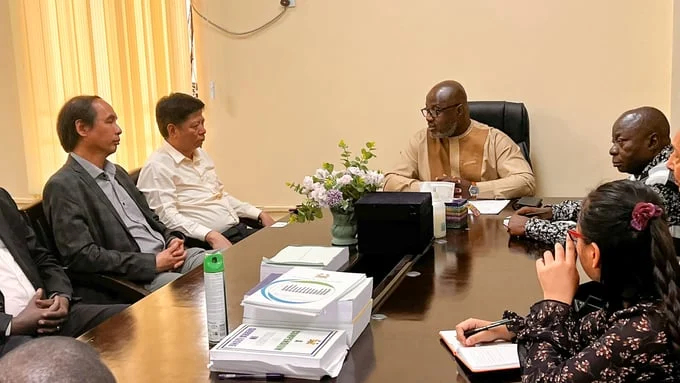May 16, 2025 | 10:39 GMT +7
May 16, 2025 | 10:39 GMT +7
Hotline: 0913.378.918
May 16, 2025 | 10:39 GMT +7
Hotline: 0913.378.918
Editor's note:
Scientific research, a quest for new knowledge, entails considerable risks. In the realm of rice research in Vietnam, investment projects seldom permit the luxury of risks and errors. This poses a formidable challenge for numerous scientists currently researching at various institutes and schools nationwide.
Amid a profound transformation in our country's rice industry, addressing this challenge requires not only a national-level initiative but also a comprehensive approach involving public-private collaboration and international cooperation.
Through discussions with seasoned researchers specializing in Vietnamese rice varieties and consultations with managers, businesses, and international organizations, a team of reporters from the Vietnam Agriculture Newspaper presents diverse perspectives on the potential establishment of the National Rice Research Fund. This initiative aims to foster the development of a sustainable, high-quality, and nutritious Vietnamese rice brand.
In an exclusive interview with the Vietnam Agriculture Newspaper, Professor Dr. Tran Duy Quy, former Director of the Institute of Agricultural Genetics, shared insights into Vietnam's agricultural evolution. He reminisced about the 1960s when the global agricultural landscape witnessed the Green Revolution (CMX). Vietnam actively participated in this movement by importing rice varieties from the International Rice Research Institute (IRRI). These foreign rice varieties, combined with local farmers' ingenuity and hard work, thrived in Vietnam's diverse climate. The success of the CMX in Vietnam's rice industry mirrored the achievements of the Green Revolution, marking a new era for rice cultivation.
Post-Doi Moi, in 1989, Vietnam transitioned from being a rice importer to an exporter, effectively ending the period of rice shortages. Rice science's shift towards production autonomy ushered in a golden era for rice science in Vietnam, characterized by remarkable advancements in rice variety research.

One of the seminal breakthroughs in rice breeding selection was developing the DT10 rice variety. Recognized by the Ministry of Agriculture and Food Industry in December 1990 as a national rice variety, DT10 swiftly gained popularity due to its exceptional attributes. This robust variety exhibited high yield, excellent resistance to lodging, and the ability to withstand pests and diseases, particularly thriving in saline environments and phosphorus-deficient soils.
The DT10 variety boasted wide adaptability and a remarkable 6-8 tons/ha yield, surpassing the average yield by 40%. Notably, it showcased strong resistance to prevalent pests such as rice blast, leaf blight, and brown planthoppers.
DT10's influence extended beyond Vietnam's borders, reaching other rice-growing nations in Asia and Africa. In the winter-spring crop of 1997 in Iraq, DT10 achieved a record yield, averaging 11 tons/ha. This success led to a visit by the vice president of Iraq to Vietnam in 1998, where cooperation agreements in agriculture were signed. The vice president expressed gratitude to the distinguished group of DT10 breeders at the Institute of Agricultural Genetics.
Since the 1960s, Vietnamese rice science has achieved remarkable progress, playing a pivotal role in ensuring food security within the country. The groundbreaking success of the DT10 variety marked the commencement of a series of scientific breakthroughs, leading to the development of high-yield, superior-quality rice varieties. These varieties exhibit resilience to intensive farming practices, resistance to pests and diseases, and broad adaptability to diverse ecological conditions. Notably, since 1990, varieties such as DT10 have effectively supplanted imported rice varieties from the International Rice Research Institute (IRRI).
Building upon these achievements, Vietnamese agricultural scientists have persevered in researching and selecting high-yield pure rice varieties, successfully replacing those imported from China. Recent advancements have seen the emergence of super high-yield rice varieties, gradually displacing some hybrid rice varieties from China. These milestones signify innovation and efficiency in rice variety research in Vietnam, signaling a significant stride towards autonomy in breeding.
Amidst these triumphs in rice science, there is a poignant note of sadness. Professor Dr. Tran Duy Quy, a key member of the research team, along with leaders Professor Dr. Phan Phat, Engineer Bui Huy Thuy, and Engineer Nguyen Van Bich, contributed to the success of the DT10 variety, earning the Institute of Agricultural Genetics prestigious awards in science and technology.

In June 1991, the NN8 rice variety faced complete collapse and severe damage due to blast disease, while DT10 stood resilient with yellow leaves, unaffected by pests at Tan Phong Cooperative, Binh Xuyen district, Vinh Phuc.
Despite enduring nearly a century of wars, Vietnamese scientists have consistently demonstrated intelligence and aptitude, earning international recognition. In the face of challenging circumstances, the state has heavily invested in science, with experts who once served the former government contributing to building a unified nation. The collaboration with foreign experts has further enriched the scientific landscape in Vietnam.
However, one source of sadness for Professor Quy is the realization that, after dedicating 53 years to studying rice and rice grains, some scientists are compelled to seek employment as hired labor. "Sometimes they lack topics to develop, but there are also times when they become overloaded. The imbalance in workload has, to some extent, impacted the researchers' ability to contribute."
Another concern for the former Director is the perceived disparity in the scientific environment within Vietnam. The country's mechanism, investment rate, infrastructure, and overall scientific atmosphere still have "some points that are not equal" compared to neighboring countries and the rest of the world. Even those aspects that are considered favorable are concentrated in a few large institutes and schools.

Dr. Tran Duy Quy, pictured in the middle, at the demonstration model of super rice NPT4 (Tan Uoc Cooperative, Thanh Oai, Hanoi) with a scale of 5 hectares, achieving a productivity of 9 tons in the Spring 2017 crop.
Taking a broader perspective, experts in rice research observe that the investment in science and technology still needs a clear focus. "Some Vietnamese research projects receive high praise globally, but we need help to apply them practically within Vietnam due to misdirection. Research is often conducted merely for publication in scientific journals," Professor Quy analyzed.
The eminent agricultural scientist in genetic breeding fully concurs with Minister Le Minh Hoan's suggestion that "research should originate from needs and real-life challenges." This, he believes, is the key to overcoming all the difficulties faced in the realm of scientific research.
Emphasizing the pivotal role of rice research, Professor Dr. Tran Duy Quy pointed out that Vietnam's current status as a self-sufficient food producer and the world's leading rice exporter resulted from the state opening up mechanisms and implementing appropriate policies to support researchers. "To be more specific, Khoan 10 was established to ensure food security, but our seedlings are still largely dependent on IRRI. Similarly, hybrid rice varieties have relied on China. This reliance has persisted for approximately 40 years," Mr. Quy highlighted.
In the last decade, with the initiation of key national-level projects, Vietnam has made significant strides in mastering the "rice game." A notable example is the KC.04 Program, led by Professor Tran Duy Quy for two courses focusing on biotechnology serving agriculture, forestry, and fisheries. In addition to enacting supportive policies, the state has facilitated the entry of modern machinery into Vietnam.
Despite these advancements, a challenging aspect of the "rice game" remains—Vietnam is only self-sufficient in 40% of hybrid rice varieties, mostly imported from China. Vietnam's current hybrid rice cultivation area stands at about half a million hectares, and researching hybrid rice proves to be a formidable task. However, Vietnam excels in cultivating selected pure rice, which rivals the productivity of hybrid rice. Mr. Quy highlighted the NPT-3 rice variety, recognized by the State in December 2017, with an impressive yield of up to 12 tons per crop when intensively cultivated.
Moreover, ongoing trials of varieties such as NPT-4 and NPT-5, with 9 tons/ha yields, are being conducted in Nigeria, Africa. Professor Quy proudly noted, "I sent ten varieties, and nearly half of them were ranked in the top 100 tested rice varieties in Africa by FAO. This reflects the pride and confidence in Vietnam's rice research capacity."

Minister of Agriculture and Food Security of the Republic of Sierra Leone Abu Bakarr Karim (seated in the middle) worked with a delegation of Vietnamese experts.
Africa emerges as a potential market for Vietnamese rice, as demonstrated by the visit of Sierra Leone's President, Mr. Julius Maada Bio, to Hanoi in March. During this visit, Professor Tran Duy Quy and scientists donated six rice varieties to Sierra Leone. Unfortunately, Sierra Leone faced financial constraints for deployment. With the Memorandum of Understanding signed on November 8, 2023, between Vietnam, Sierra Leone, and FAO, and the upcoming commitments to South-South Cooperation, it is anticipated that this African country will bolster its rice value chain.
Nothing is impossible
To further underscore Minister Le Minh Hoan's assertion that science grounded in practical applications can achieve the seemingly impossible, Professor Tran Duy Quy shared the inspiring story of Dr. Tran Tan Phuong. Dr. Phuong, who directed and actively participated in selecting and creating numerous ST fragrant rice varieties, is the co-author of ST5 and ST13 rice varieties and the primary author of several other ST fragrant rice varieties.
"Initially, under my guidance and that of Associate Professor Dr. Nguyen Thi Tram, Mr. Phuong toiled tirelessly in the fields day and night. He embarked on a challenging endeavor, choosing to crossbreed 12 pairs of Vietnam's best parent rice varieties spanning from North to South — an idea that faced opposition from some experts. However, the results unequivocally proved the critics wrong."
The methodology employed by Dr. Phuong involved a meticulous process of selection and exclusion. Specifically, he focused on traits such as black and white flower colors and wrinkled or non-wrinkled fruits, employing programmed breeding techniques to yield the renowned ST rice varieties. Currently serving as the Deputy Director of the Soc Trang Department of Agriculture and Rural Development, Dr. Phuong's dedication and innovative approach has left an indelible mark on rice research in Vietnam.
Professor Dr. Tran Duy Quy emphasized the unique qualities of Vietnam's rice varieties, describing them as delicious, aromatic, and characterized by short growth cycles and high yields. He believes this sets Vietnamese rice varieties apart and underscores the country's distinctive contributions to rice cultivation.
Translated by Quynh Chi

(VAN) Cold-barn systems efficiently manage environmental and temperature conditions, which aids in the prevention of respiratory diseases in pigs and protects them from the vectors that transmit African swine fevers.

(VAN) To tackle challenges, the project 'Addressing key technical bottlenecks in the grouper supply chain in Vietnam' has been underway since 2024.

(VAN) The project 'Disease-Resilient and Sustainable Cassava Production Systems in the Mekong Region', funded by the Australian Center for International Agricultural Research (ACIAR), is being implemented from 2024 to 2028.

(VAN) Data from 10,000 farming households will help professionalize production organization and support the implementation of the One Million Hectares Program for High-Quality, Low-Emission Rice Cultivation.

(VAN) FAO Director-General QU Dongyu marks International Day of Plant Health at NENA conference.

(VAN) Deputy Minister of Agriculture and Environment Hoang Trung affirmed that floriculture and ornamental plants are a growing industry that receives significant global attention.

(VAN) The three staple crops dominating modern diets – corn, rice and wheat – are familiar to Americans. However, fourth place is held by a dark horse: cassava.